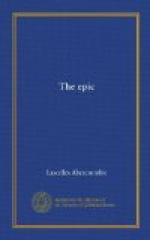In Paradise Lost, the development of epic poetry culminates, as far as it has yet gone. The essential inspiration of the poem implies a particular sense of human existence which has not yet definitely appeared in the epic series, but which the process of life in Europe made it absolutely necessary that epic poetry should symbolize. In Milton, the poet arose who was supremely adequate to the greatest task laid on epic poetry since its beginning with Homer; Milton’s task was perhaps even more exacting than that original one. “His work is not the greatest of heroic poems, only because it is not the first.” The epigram might just as reasonably have been the other way round. But nothing would be more unprofitable than a discussion in which Homer and Milton compete for supremacy of genius. Our business here is quite otherwise.
With the partial exception of Tasso and Camoens, all epic poetry before Milton is some symbolism of man’s sense of his own will. It is simply this in Homer; and the succeeding poets developed this intention but remained well within it. Not even Virgil, with his metaphysic of individual merged into social will—not even Virgil went outside it. In fact, it is a sort of monism of consciousness that inspires all pre-Miltonic epic. But in Milton, it has become a dualism. Before him, the primary impulse of epic is an impassioned sense of man’s nature being contained—by his destiny: his only because he is in it and belongs to it, as we say “my country.” With Milton, this has necessarily become not only a sense of man’s rigorously contained nature, but equally a sense of that which contains man—in fact, simultaneously a sense of individual will and of universal necessity. The single sense of these two irreconcilables is what Milton’s poetry has to symbolize. Could they be reconciled, the two elements in man’s modern consciousness of existence would form a monism. But this consciousness is a dualism; its elements are absolutely opposed.




